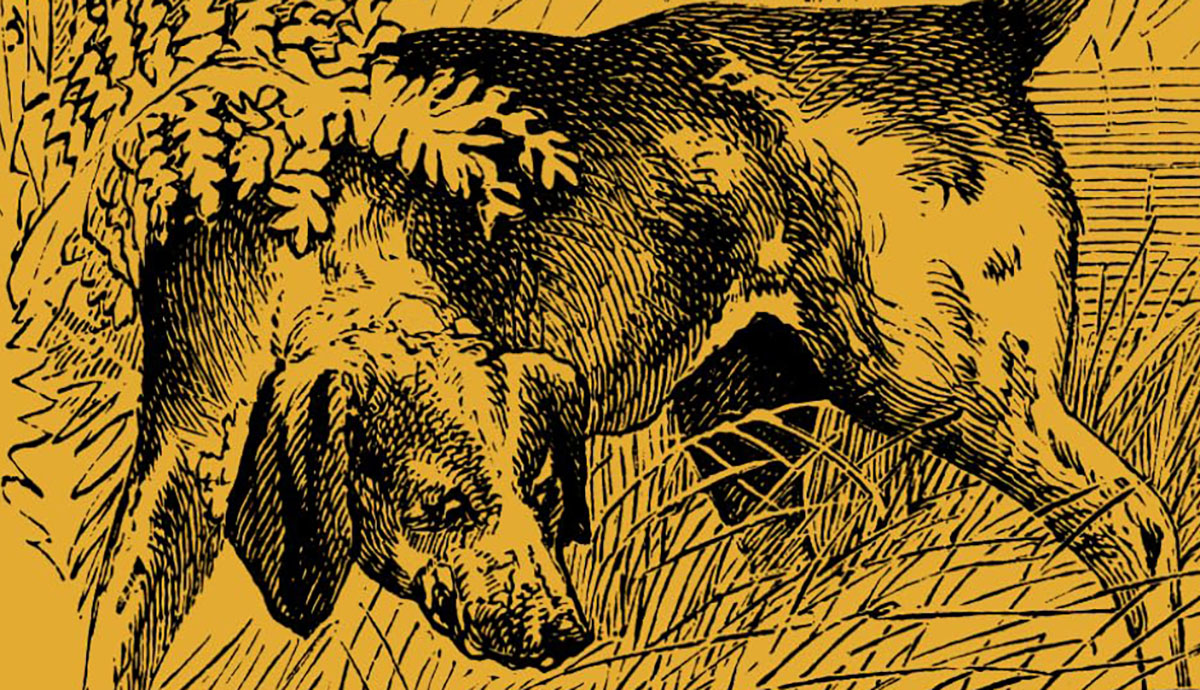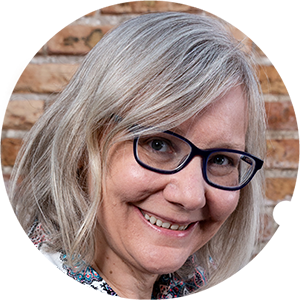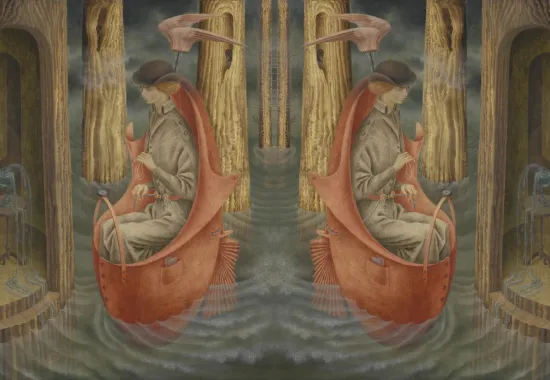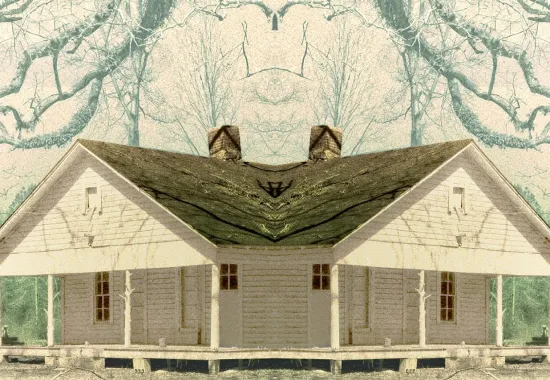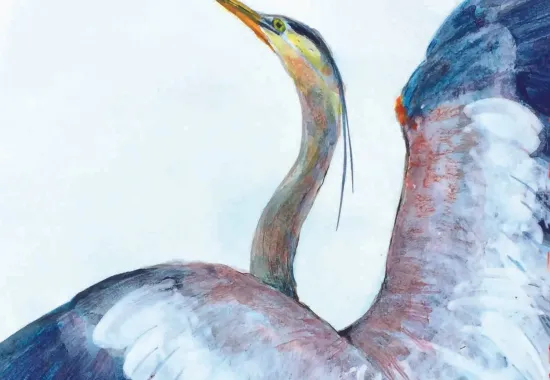A Review of What My Hound Dog Is Scenting Through the Sloughgrass Is a Way of Scenting Me by George Kalamaras
Blueticks. Redbones. Treeing Walkers. Plott hounds. Bobcat hounds. Sloughgrass. Eelgrass. Canary grass. These are just a few of nature’s marvels that readers will awaken to while trekking with George Kalamaras through his latest awe-inspiring poetry collection, What My Hound Dog Is Scenting Through the Sloughgrass Is a Way of Scenting Me (Wolfson Press).
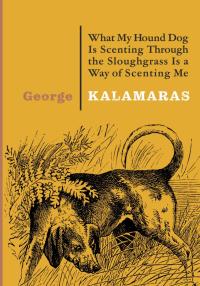 As I sat on the couch with my family’s beloved mutt, Angiebelle, I could not help but read an occasional passage aloud to her as I rambled through the book. Dogs, of course, are multilayered and, likewise, Kalamaras’ book explores themes ranging from the essential nature of the hound dog to transformation and to metaphysics, all seamlessly interwoven throughout seven sections. The result is a treatise on life by a learned yet humble poet.
As I sat on the couch with my family’s beloved mutt, Angiebelle, I could not help but read an occasional passage aloud to her as I rambled through the book. Dogs, of course, are multilayered and, likewise, Kalamaras’ book explores themes ranging from the essential nature of the hound dog to transformation and to metaphysics, all seamlessly interwoven throughout seven sections. The result is a treatise on life by a learned yet humble poet.
I would use “persona” to describe the poems’ narrator, but these first-person pieces are obviously personal. Kalamaras sets the stage for readers with rich place details from his Indiana upbringing and when he’s speaking to and of his beagle-hounds, Barney, Bootsie, and Blaisie, to whom the book is dedicated. His wife, writer Mary Ann Cain; his friends near and “bodiless,” John, Dan, and Ray; and his numerous literary mentors, from Wang Wei to Walt Whitman also feature prominently.
Hound dogs are catalyst for discussions from his perspective as a hippie (in the best sense) and as a student of world philosophies. The poet even creates his own hound dog mythology, complete with creation myth. “Let’s Begin with the Way Stars Work,” opens, “First, there’s light from one of Jupiter’s many / gaseous moons. Then a hound embryo / appears, beginning its sixty-three day / gestation.”
To Kalamaras, there can be no speciesism, as we see in such lines as:
The hound is real, even the one disguised
as a sleeping owl, with which they replaced
your heart.
Kalamaras becomes a hound dog. We become hound dogs. All is interconnected.
Moreover, hound dogs, owls, and hearts are inextricably interlocked throughout the work. One significant way is through reincarnation: “Listen: Once I was a baby / screech owl emerging from a linden / tree in Lima, Ohio.” In fact, throughout the pages, the poet is repeatedly reincarnated.
My Hound Dog is a work about dogs, entailing everything from superstition (“There Are Many Moods Swimming Through the Dark”) to ekphrasis based on historical images of hunters with hound dogs. (Although, it should be noted that the poet would never kill an animal, as illustrated in “Jack Huntly and Ivan James Go Rabbit Hunting with Their Dogs” when he states, “though I’d likely dart ahead / of the dogs and tell the rabbits who and what / we intend.”) The collection also contains poems about becoming.
We see Kalamaras becoming in “Eighteen Eighteen-Word Short Stories About Plott Hounds,” in which he imagines being contacted by Walt Whitman, who tells him to stop imitating him—and Kalamaras listens, becoming a poet in his own right. Similarly, in “The Now-Wet Slapping in the Throat,” a poem about becoming a dog “owner” (a term of which he is suspicious, if not contemptuous) upon being gifted his first hound dog, the poet writes, “the spaces between my words / would never again be the same.” Several texts are about becoming even as life of the body wanes, such as in the one-poem, same-titled first section, “What We Learn to Bow Down To”:
The I-am-born
equaling the I-must-leave-the-body-
on-a-Monday-night-at-eight.
Like a sand mandala ritualistically dismantled and released into water, healing energy given to the world, always, in the work, the end brings beginning.
Always, the “I” is transcended. In “You Ask About the Opioid Epidemic, and I Hand You a Mirror of Possum Blood,” Kalamaras writes, “Lives are scraped inside out while politicians argue / whether teachers should carry and conceal blow darts // dipped in the bladder of a termite-eating frog.” Correspondingly, in “When I Say the Unborn, I Think of Zen Master Bankei … ,” he imagines us being able to say “That we lived / for one another, / finally, full,” envisioning a better world for all beings.
Kalamaras expects readers to roll up our sleeves and work, taking leaps of faith to follow associations and streams of consciousness that converge in the same or in a different poem. His use of language is somehow rich and spare simultaneously. To illustrate, consider the following lines from his title poem: “And it’s my torn parts / the hound scents down deep in the moon-drenched swamps / where even the owls have drowned,” which underscores the invaluable nature of the human/canine relationship.
Furthermore, his poems, mainly free verse, are varied, external structure informing content magnificently. Readers’ experience one-stanza torrents, two-line stanza poems with enjambment that unfurl more slowly, long-stanza poems periodically punctuated by emphatic single-line stanzas, and segmented poems. Among those most spatially interesting is “The Bobcat Cleanse of Hounds,” which, after an epigraph, begins:
I will pray over the bobcat cleanse the hounds
Expel the scent of death driven forth from the forging
part of their brain
Such pieces demand rereading, mulling.
Each work is technically outstanding, every nuance seemingly considered, from word and capitalization choices to use of sound with a gift for assonance, including the title poem, itself. Why capitalize “Is” twice, we must ask. For our labor, the reward is remarkable.
Although My Hound Dog is his twenty-third poetry collection, Kalamaras has no intention of this work being his magnum opus. When I read, “If I were to die tonight I would be one day younger / Than the hope of knowing the workings of bees” (“If I Were to Die Tonight I Would Be One Day Younger”), I sense that he will attain that hope, pen in hand.
As I finish writing this review, Angiebelle looks up at me with her huge, brown, love-me eyes. In turn, I read to her from “What We Learn to Bow Down To”: “And the things we grow, what we learn / to bow to. And the hound dog’s snout, / great and good and nobly stout. Taking it all. / In. All the way down to the ground.” Bow, indeed.
Read George Kalamaras’s “The Poem We Start Starts Us, as We Start Forth,” originally published in the Summer 2019 issue of the North American Review and appearing in What My Hound Dog Is Scenting Through the Sloughgrass Is a Way of Scenting Me.
Recommended
A Review of Portable City by Karen Kovacik
A Review of Haircuts for the Dead by William Walsh
A Review of Birdbrains: A Lyrical Guide to the Washington State Birds


